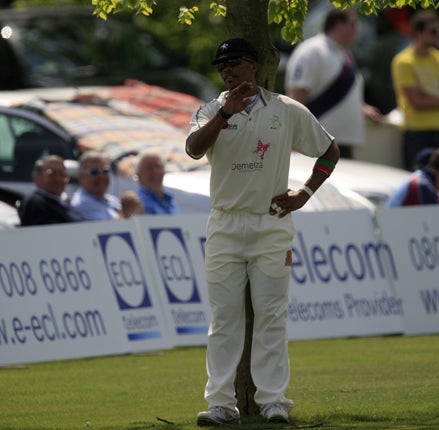Ntini is fired up for a whole new ball game

Given there may be no more significant athlete in South African history, it seems ironic that most of the football supporters now heading for the country have probably never heard of Makhaya Ntini.
The adulation with which a cricketer will be greeted by the home nation's soccer fans when appearing in his role of World Cup ambassador may therefore leave many somewhat confused.
Sitting outside the Kent dressing room on a cold afternoon at Durham's Riverside Stadium, Ntini smiles, as he so often does. "Yes, yes indeed, especially as it's a different ball game. But as a cricketer for me to be there, and part and parcel of what's going on in our country, it's a huge thing, something I'm proud of as a country, as a person and as an individual.
"Cricket in South Africa is not exclusively white, but it is more white-dominant. The football is more black-dominant, so they are two different ball games in every respect. For those of us who don't play football, we have to make sure we are 10 per cent ahead of anything else, regarding fitness, regarding preparation, everything, for us to compete with the other players. In a white-dominant sport, to stay there for longer, those kind of things we have to go through." Which, of course, goes much of the way towards explaining his iconic status.
For a poor black boy to have carved a hugely successful international career in a sport where historically and culturally the odds were so stacked against him, means Ntini has become so admired in his country. Naturally, this gives him huge influence. It was Ntini, not Jacques Kallis or Graeme Smith, who was invited to appear alongside Charlize Theron and David Beckham when the World Cup group draw was televised last year.
It does not seem to have changed him. When he was dropped after his 101th Test, played against England at Durban last December, it would have been easy for Ntini to accept that his international career was over and set about exploiting his celebrity to pursue opportunities elsewhere.
A lucrative season or two in county cricket could be part of that, and might still be, but the 32-year-old refuses to accept his international career is over.
"I have enjoyed my time [with Kent] and I would definitely love to come back, but first I must sort out my cricket life back home and see if I am still involved with the national team. If not, playing county cricket will be my second option," he said. "I only need 10 [Test] wickets to get to 400, and I am crossing my fingers I will be given that opportunity. If it was not me, if it was anyone else, only 32 and still needing 10 wickets for 400, he would definitely [get the chance]. You know, 'We'll try and get him those wickets'."
The implication would be a troubling one were it not for the fact that Ntini's omission appeared justified on cricketing grounds. On the other hand his domestic record this year for both Warriors in South Africa and then for Kent (for whom he took 24 first-class wickets in five games) has been impressive. But it has gone unacknowledged by Cricket South Africa, according to Ntini. Yet while he was not included in the squad to tour West Indies, Andrew Hudson, South Africa's convener of selectors, has subsequently said that his form for Kent is encouraging and that he will be considered for selection for upcoming series.
In the meantime, Ntini will be at home, enjoying the World Cup and continuing to raise funds to build a cricket academy in his home, the Eastern Cape. "We do have a structure in South Africa where they are looking for black cricketers outside the usual areas, the cities. They go to the rural areas to try and find promising youngsters.
"But when you are talking about whether it's developing, or it's still going down a bit, it's a very rare person who will answer in the first way. I would say cricket from the point of view of the black community is not the same as when Khaya Majola or Dr Ali Bacher were around, when it was booming, we had all the schools getting together to play some games.
"Then it was easier to see who was a very good cricketer, who could go to the high schools and develop their cricket. Now it's not so easy. I would like that to change."
Join our commenting forum
Join thought-provoking conversations, follow other Independent readers and see their replies
Comments
Bookmark popover
Removed from bookmarks